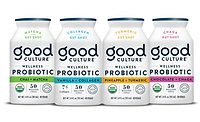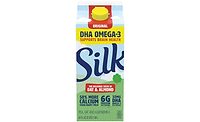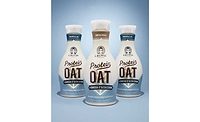2019 State of the Beverage Industry: Dairy category benefits from flexible consumers
New forms of alternative milks emerge

Beverages crafted with health and wellness in mind have been permeating the market, and dairy drinks and dairy alternatives are no exception. As consumers trend toward beverages fortified with protein, whether animal-based or plant-based, the dairy category is benefiting from consumers being flexible about their protein source.
Recently, more and more consumers are embracing a “flexitarian” lifestyle and consuming both animal-based dairy and plant-based dairy alternatives. “We talk about flexitarian and folks not fully going to veganism, but from a holistic health standpoint consumers are trying to be much more balanced in their diets,” said John Crawford, vice president of client insights for dairy at Chicago-based Information Resources Inc. (IRI), in Beverage Industry’s November 2018 issue. Crawford added that half of consumers reported drinking dairy and dairy alternatives like almond milk.
As consumers show more flexibility, the dairy category is seeing an overall decline. The milk category as a whole reached $15.1 billion in sales, reflecting a 2.3 percent decrease in sales compared with the previous year for the 52 weeks ending May 19, in IRI measured U.S. multi-outlets. On average, most dairy-based milk brands also decreased in sales within that same timeframe, according to IRI data.
However, market research analysts note that the decline of dairy was taking place prior to the growing popularity of alternative milks. “We know the challenges with dairy milk,” Crawford said. “We know that there’s a lot of challenges with it. It’s been declining for 30 years. There’s a whole slew of reasons for these declines. It’s as simple as the rise of bottled water. If you really think of who milk loses to, you can only have so much liquid in your system and a lot of it has gone to bottled water.”
Some of the more recent declines are due to the growth of plant-based alternatives, he added.
In Beverage Industry’s November 2018 issue, Gary Hemphill, managing director of research at New York-based Beverage Marketing Corporation (BMC), noted that the alternative market is led by almond milk, with soy milk a distant second.
(Individual brands)
| DOLLAR SALES | % CHANGE VS. PRIOR YEAR | MARKET SHARE | % CHANGE VS. PRIOR YEAR | |
| Blue Diamond | $493,487,940 | 10.2 | 40.0 | -0.1 |
| Silk | $423,089,075 | 4.2 | 34.3 | -2.1 |
| Private Label | $224,151,379 | 21.1 | 18.2 | 1.6 |
| Califia Farms | $84,930,865 | 20.8 | 6.9 | 0.6 |
| Hiland | $4,149,236 | -7.1 | 0.3 | -0.1 |
| Category total* | $1,234,853,204 | 10.5 | 100.0 | 0.0 |
*Includes brands not listed.
Source: Information Resources Inc. (IRI), Chicago. Total U.S. supermarkets, drug stores, gas and convenience stores, mass merchandisers, military commissaries, and select club and dollar retail chains for the 52 weeks ending May 19.
Refrigerated almond milk saw an increase of 10.5 percent in dollar sales, reaching $1.2 billion, for the 52 weeks ending May 19, according to IRI data. Although refrigerated soy milk is a popular alternative to dairy, it joined dairy-based milk on its downhill slide with a decrease in sales of 11.7 percent within that same timeframe, based on IRI data. Also on the decline is refrigerated kefir with a 9.2 percent decrease in dollar sales.
As the original “dairy alternatives” are facing challenges within the market, new alternatives are finding their way in. “Like all beverage categories, we have seen no shortage of innovation in dairy alternatives,” BMC’s Hemphill said. “New options are being introduced and each has its benefits.”
(Individual brands)
| DOLLAR SALES | % CHANGE VS. PRIOR YEAR | MARKET SHARE | % CHANGE VS. PRIOR YEAR | |
| Silk | $145,245,097 | -12.7 | 77.7 | -0.9 |
| Private Label | $35,188,246 | -4.3 | 18.8 | 1.5 |
| 8th Continent | $5,357,384 | -24.3 | 2.9 | -0.5 |
| All Booth Brothers | $742,534 | -1.6 | 0.4 | 0.0 |
| Wildwood | $219,180 | 6.5 | 0.1 | 0.0 |
| Category total* | $186,952,937 | -11.7 | 100.0 | 0.0 |
*Includes brands not listed.
Source: Information Resources Inc. (IRI), Chicago. Total U.S. supermarkets, drug stores, gas and convenience stores, mass merchandisers, military commissaries, and select club and dollar retail chains for the 52 weeks ending May 19.
Chicago-based Euromonitor International’s September 2018 report titled “Drinking Milk Products in the US,” details some of the plant-based innovations fueling the alternative milks market. “Oat milk is the latest plant-based milk alternative to appear on retail shelves,” it states. “Gluten-free, naturally creamy and more environmentally sustainable than nut-based or soy milks due to lower water and GMO usage, oat milk is set to capitalize on multiple lifestyle trends as it is introduced into more stores across the country.
(Individual brands)
| DOLLAR SALES | % CHANGE VS. PRIOR YEAR | MARKET SHARE | % CHANGE VS. PRIOR YEAR | |
| Lifeway | $71,832,108 | -10.8 | 77.9 | -1.4 |
| Private Label | $4,036,979 | -3.6 | 4.4 | 0.3 |
| The Greek Gods | $3,514,075 | -21.2 | 3.8 | -0.6 |
| Fresh Made | $3,296,476 | 22.2 | 3.6 | 0.9 |
| Wallaby | $2,316,131 | -17 | 2.5 | -0.2 |
| Category total* | $92,263,313 | -9.2 | 100.0 | 0.0 |
*Includes brands not listed.
Source: Information Resources Inc. (IRI), Chicago. Total U.S. supermarkets, drug stores, gas and convenience stores, mass merchandisers, military commissaries, and select club and dollar retail chains for the 52 weeks ending May 19.
“Milk made from peas has the potential for similar growth as it boasts high protein content and less water usage than nuts,” the report continues.
Although dairy-based milk is seeing much competition from the alternatives market, there still is hope for it to succeed, experts say. In its report, Euromonitor’s report suggests that fortification could help the milk industry compete with the growing alternative milks market. “[C]ow’s milk manufacturers are finding new ways to enhance traditional milk,” it says. “Fortifying cow’s milk with omega-3 or A2 ß-casein meets consumer demand for specific nutrients that mirror the benefits seen in milk alternatives, offering room for growth in cow’s milk sales.” BI
Looking for a reprint of this article?
From high-res PDFs to custom plaques, order your copy today!







